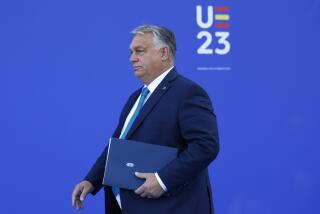EUROPE: FIVE YEARS LATER : FIVE YEARS AFTER THE FALL OF THE WALL : Communist Europe collapsed in a few months. But rebuilding the lives of its people is a process that will take many years.
- Share via
November 9, 1989, the day the Berlin Wall fell and the world changed forever. Not even the most astute saw it coming.
As Hungary’s foreign minister in the late summer of 1989, Gyula Horn gave the order to let visiting East Germans use his country to do a 400-mile end run around the Berlin Wall, a move now seen as the beginning of the end for hard-line communism in Europe.
“I hadn’t realized that such historical change would come after that,” Horn now says.
Far to the east in his Moscow office, former Soviet President Mikhail S. Gorbachev looks back at might-have-beens.
“The process could have gone in a different way if East Germany had changed, had opened up to the world,” he claims, recalling how he urged that country’s leadership to steer a reform course. “(Communist Party leader Erich) Honecker rejected it. So did most of his entourage. And they lost.”
And how they lost.
The breathtaking speed of East Germany’s demise, the sudden opening of the Berlin Wall and the rapid-fire collapse of similar regimes in Czechoslovakia, Bulgaria and Romania, all within a period of six weeks, left Europeans on both sides of the ideological divide euphoric, dizzy and woefully unprepared for the challenges of a post-Cold War world.
To be sure, half a Continent has won its freedom, the military doctrine of mutually assured destruction belongs to history and few would turn the clock back if they could. Yet no one believed it could all be so hard.
Extended visits by Times correspondents to five communities in four nations paint a new, often troubling picture of post-Cold War Europe as it struggles for a new direction. What they found is a patchwork of hope, success, worry, fear and a few pockets of total despair.
They found that with socialism’s barriers to wealth and its protection from poverty stripped away, communities--and nations--in the formerly Communist east are gradually separating into winners, losers and those just trying to hang on.
For the Polish industrial town of Plock, five years of freedom have brought the first millionaire, the first homeless shelter and a simple, hard truth about life without communism: No job is secure. “ If you are not good at your job, you will lose it,” said 20-year-old factory worker Teresa Bonatowska. “And even if you are good at your job, you may lose it.”
Western cash injections running at $100 billion a year have generated economic liftoff for eastern Germany, but the weight of history still divides Germans in other ways.
“I can’t pick my countrymen, but I have more in common with Belgians and Dutch (than with eastern Germans),” notes Rainer Scherer, a technical school employee in the west German city of Pforzheim.
In parts of southeastern Europe, such as the onetime Romanian industrial stronghold of Vaslui, the end of communism has only made untenable conditions worse. There, official unemployment is 37%, and the quest for a better life remains mired in a rut of mistrust, manipulation and defeatism.
Across Romania’s western border, the disintegration of Yugoslavia and the horrors of the war in Bosnia-Herzegovina have destroyed more than a nation and its people. They have shaken the Continent’s belief in itself and ended the myth that Europe had moved beyond such barbarity.
But whatever their experience since 1989, one truth is agreed upon by all Europeans: Putting the Old World back together again will take far longer than anyone initially could have imagined.
“I used to be very impatient,” recalls Vaclav Havel, the Czech revolutionary who is now his country’s president. “Everything seemed to be moving slowly, but in the end, I have ... come to understand that everything needs its time.”
More to Read
Sign up for Essential California
The most important California stories and recommendations in your inbox every morning.
You may occasionally receive promotional content from the Los Angeles Times.













